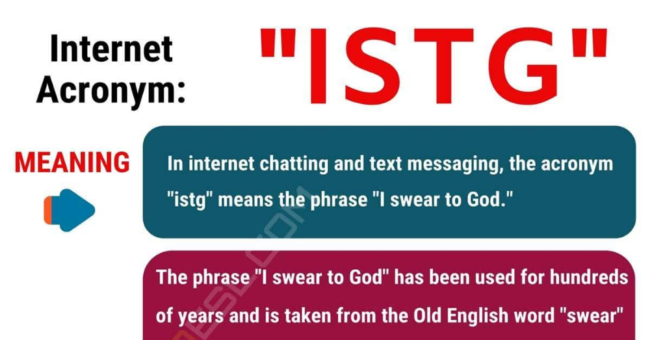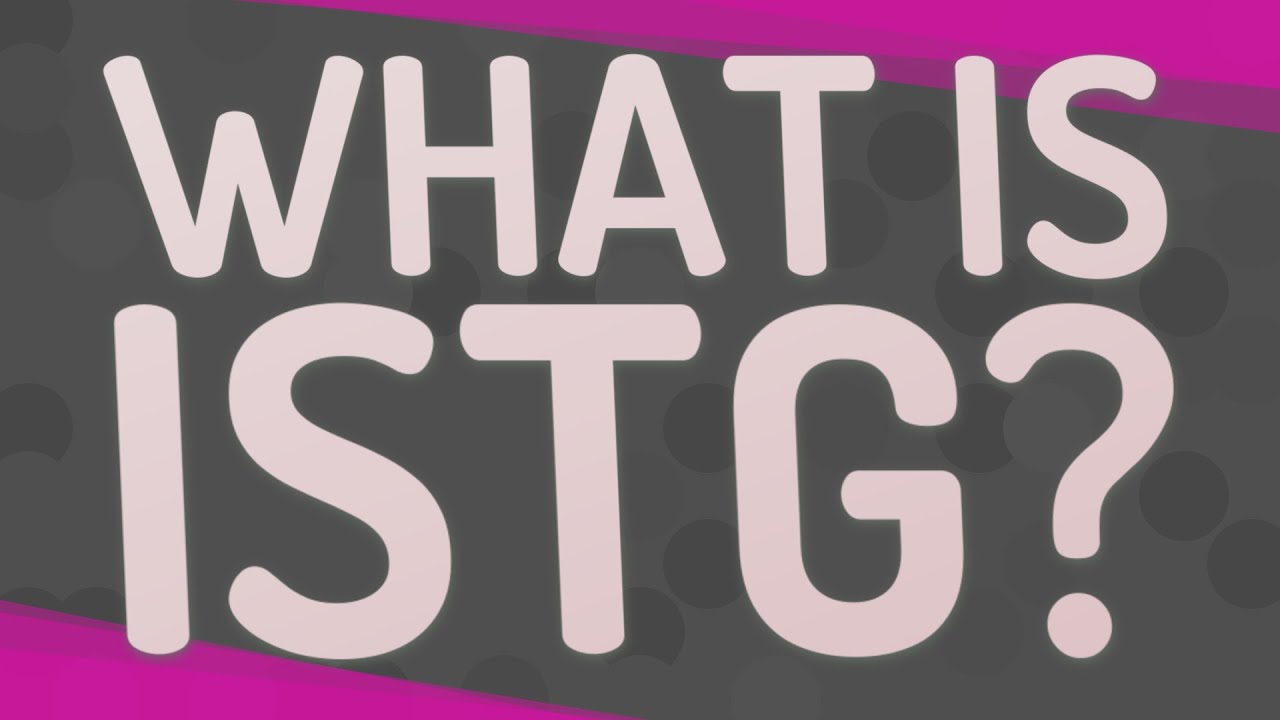In the fast-moving world of digital communication, people don’t just type words anymore—they type feelings, reactions, and tone. Language has been co
In the fast-moving world of digital communication, people don’t just type words anymore—they type feelings, reactions, and tone. Language has been compressed, stylized, and transformed through texting, tweeting, and tagging. Among the flood of acronyms that dominate social media and instant messaging, ISTG is one of the most expressive and commonly used.
But if you’ve ever paused while reading a post or message that ends with “ISTG” and wondered what it meant or why it was there, you’re not alone.
In this article, we’ll unpack the acronym ISTG—what it means, how it’s used, where it came from, and why it’s become a go-to phrase for so many internet users.
Must visit: swiftnewsnow

What Does ISTG Mean?
Let’s start with the basics.
ISTG stands for “I Swear To God.”
It’s typically used to:
- Emphasize a strong feeling (e.g. frustration, disbelief, excitement)
- Assert honesty or sincerity
- Exaggerate for humor or dramatics
Though it contains a reference to God, ISTG is used in most modern contexts as slang rather than a literal or religious expression.
For example:
- “ISTG if my phone dies one more time…”
- “ISTG that was the funniest thing I’ve ever seen!”
- “ISTG I didn’t say anything about you.”
Tone and Emotion Behind ISTG
One of the things that makes ISTG so powerful is its emotional flexibility. It doesn’t just state facts—it expresses feelings. The acronym functions like a bold underline or a verbal exclamation mark. Depending on the situation, ISTG can mean:
- “I promise I’m telling the truth.”
- “This really made me mad!”
- “I can’t believe what just happened.”
- “I’m being 100% serious right now.”
Think of it like a mood amplifier.
It adds emotional volume to whatever is being said, especially in short-form writing where tone is easy to misread.
Common Contexts for Using ISTG
Let’s explore some common scenarios where you might see ISTG in action:
1. In Texts and DMs
Most frequently, ISTG appears in personal conversations between friends or family. People use it to clarify honesty or to vent.
“ISTG, I wasn’t trying to ignore you.”
“ISTG if mom calls me again about the dishes 😩”
2. On Social Media
You’ll find ISTG used to emphasize the emotion behind posts, comments, or reactions.
“ISTG this filter turned me into a whole Disney character 💀”
“ISTG if one more person brings pineapple to the pizza party…”
3. In Memes and Captions
In the meme world, ISTG works as part of exaggerated humor. It can help enhance the absurdity or intensity of a joke.
Picture of a cat glaring at a cucumber:
“ISTG he’s plotting revenge.”
4. Gaming and Streaming Platforms
Gamers often use ISTG in rage moments or when making claims that need to be believed without question.
“ISTG I shot first—that lag is unreal.”
Is ISTG Serious or Sarcastic?
The tone of ISTG depends entirely on the context. Let’s look at a few variations:
✅ Serious Tone:
“ISTG I didn’t tell anyone your secret.”
In this use, ISTG is a solemn assertion of honesty—much like saying “I promise” or “Trust me.”
😠 Frustrated or Angry:
“ISTG if they cancel this show, I’m done.”
Here, the speaker is using ISTG to express annoyance or exasperation.
😂 Playful or Sarcastic:
“ISTG this cereal just healed my childhood trauma.”
This is clearly an exaggeration for comedic effect—meant to be lighthearted and humorous.
A Short History: Where Did ISTG Come From?
The phrase “I swear to God” has been around for centuries. It was once a religious or legal oath, used to declare truthfulness with divine witness.
However, as language moved into the digital age, the phrase became less about literal belief and more about emotional expression. By the early 2000s, as texting and online chat became common, abbreviations and acronyms took over the scene.
ISTG emerged as part of this movement—shortening longer phrases for faster, more efficient communication. Now, it’s firmly embedded in Gen Z and Millennial online vocabulary.
Is ISTG Offensive?
This is an important question. Because ISTG references “God,” it can sometimes make people uncomfortable—especially in religious or formal settings.
It may be considered inappropriate when:
- Talking to someone who is deeply religious
- Writing or speaking in a professional setting
- Communicating with people from cultures where invoking divine figures casually is frowned upon
That said, most users today treat ISTG as informal slang, not a literal oath or disrespectful phrase. But it’s still wise to consider your audience before using it.
Alternatives to ISTG
If you’re looking to avoid religious references or simply want other expressions that convey the same idea, here are some alternatives:
| Expression | Meaning |
| I promise | A sincere guarantee |
| No cap | Gen Z slang for “no lie” |
| For real (FR) | Confirmation of truth |
| I’m serious | Straightforward honesty |
| I mean it | Emphasizes intention |
Each of these can replace ISTG depending on the tone you’re going for.
Generational Differences in Usage
Gen Z (born ~1997–2012):
They’re the most frequent users of ISTG. It’s native to their way of communicating—especially on apps like TikTok, Snapchat, and Discord.
Millennials (born ~1981–1996):
Many Millennials also use ISTG, particularly in casual settings or when joking around online.
Gen X & Boomers:
These groups are less likely to use ISTG. They may find it confusing or interpret it more literally, especially those with stronger religious backgrounds.
ISTG in Pop Culture and Media
Over time, ISTG has moved beyond just chat bubbles. It shows up in:
- TikTok captions and comment threads
- YouTube reaction videos
- Tweets reacting to celebrity drama
- Meme pages and viral screenshots
For example, if a celebrity drops a surprising announcement, someone might reply:
“ISTG I wasn’t ready for this today.”
This illustrates how ISTG helps people react in a relatable and expressive way, even to public events or viral trends.
Mistakes to Avoid When Using ISTG
While ISTG is widely used, there are some things to keep in mind:
1. Overusing it
Like any slang, it loses impact if used in every sentence. Use it when you need to emphasize a point, not just as filler.
2. Using it in formal communication
Avoid ISTG in work emails, academic writing, or anything professional.
3. Assuming everyone understands it
If you’re speaking with older family members or people unfamiliar with internet slang, they may not recognize ISTG—or could misunderstand it.
Real-Life Scenarios: ISTG in Action
Scenario 1: Apology & Honesty
You: “ISTG I didn’t mean to forget your birthday. I feel awful.”
✅ Honest, remorseful, sincere.
Scenario 2: Venting to a Friend
You: “ISTG my boss gives me anxiety every Monday.”
✅ Casual frustration.
Scenario 3: Online Reaction
Tweet: “ISTG if Rihanna drops an album this year, I’ll cry.”
✅ Emotional anticipation, slightly exaggerated for humor.
FAQs About ISTG
Q1: What does ISTG stand for?
A: It stands for “I Swear To God.”
Q2: What does ISTG mean in texting?
A: It emphasizes sincerity, emotion, or frustration. It’s often used to intensify a point.
Q3: Is ISTG offensive or bad?
A: Not usually. It depends on context. Some people may find it inappropriate due to religious references.
Q4: Can ISTG be used in a funny way?
A: Yes! It’s commonly used with exaggeration or sarcasm for comedic effect.
Q5: Is ISTG used more by Gen Z?
A: Yes, it’s especially popular among Gen Z and Millennials.
Q6: Is ISTG the same as “I swear”?
A: Mostly, yes. But ISTG adds more intensity or emotion due to the “to God” part.
Q7: Should I use ISTG in school or work?
A: No. It’s informal slang and not appropriate in professional or academic settings.
Q8: What are similar expressions to ISTG?
A: “No cap,” “For real,” “I promise,” and “I’m serious
ChatGPT said:
” are similar in tone.
Conclusion: Why ISTG Matters in Digital Talk
ISTG is a perfect example of how language adapts in the digital age. It’s short, expressive, and flexible—perfect for a world where quick typing and emotional nuance collide.
Understanding ISTG helps decode online conversations and lets you join in with confidence. Whether it’s expressing frustration, making a promise, or just adding some spice to your texts, ISTG says a lot in just four letters.
So next time you see ISTG pop up in your messages or on social media, you’ll know it’s more than just an acronym—it’s a way people show they really mean it.




COMMENTS